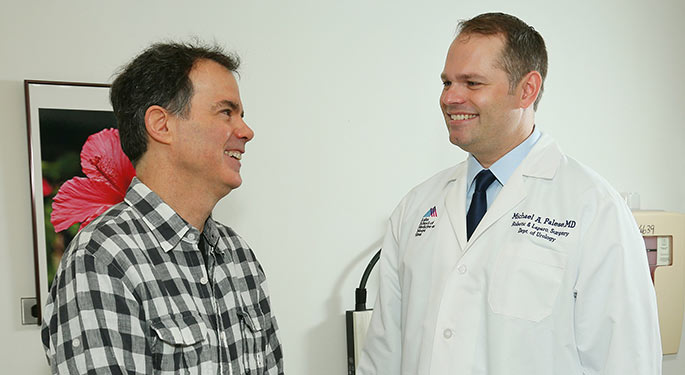Minimally Invasive Surgery

At Mount Sinai Urology, we lead the field in minimally invasive procedures and techniques for various urological conditions. This approach generally results in successful outcomes while minimizing treatment side effects. Patients can experience a reduction in blood loss and shorter hospital stays with a quicker recovery and less pain. To perform minimally invasive procedures, our doctors make small incisions in the skin rather than cutting through the chest or abdomen.
We use this approach to treat a variety of conditions. It is generally effective for urological cancers such as adrenal, bladder, kidney, prostate, testicular, transitional cell, and ureteral cancer. We also use minimally invasive surgery to treat kidney stones and benign prostatic hyperplasia.
Surgical Techniques
We use several minimally invasive techniques.
Robotic surgery is highly effective for prostate, kidney, ureter, and bladder conditions. Mount Sinai Urology is one of the busiest robotic surgery programs in the United States, performing more than 700 robotic procedures a year. Our team of doctors is consistently recognized for their expertise in robotic surgery for prostate and kidney cancer.
Laparoscopic surgery is an area in which we are noted experts and thought leaders, teaching national and international courses to other physicians about this procedure. Using small openings in the abdominal and pelvic cavity, we perform surgical procedures without making large incisions. We use laparoscopic surgery for procedures involving the kidney (particularly for kidney cancer removal, donor transplant surgery, and partial nephrectomy where we remove only a small part of the kidney) and the adrenal glands.
Endoscopic surgery is a subset of minimally invasive procedures that uses an endoscope, which is a tiny video camera. We use endoscopic surgery to perform cystoscopy, ureteroscopy, and percutaneous nephrolithotomy/nephrolithotripsy. We perform thousands of these procedures every year with a particular focus on the minimally invasive treatment of benign prostatic hyperplasia (BPH) and kidney stone disease.
Laser surgery is a common tool for treating kidney stones and BPH. We have access to the newest technologies in this area and are well versed with all types of laser surgery treatments, including GreenLight™ laser and Holmium laser treatments.
Why Mount Sinai?
Dr. Michael Palese is the Director of Minimally Invasive Urology and is a Board Certified Fellowship trained surgeon specializing in robotic, laparoscopic and endoscopic surgery. Dr. Palese established the robot surgery program at Mount Sinai and has extensive experience with robotic and laparoscopic renal and adrenal surgery having performed over 3000 surgeries, including donor nephrectomy, radical nephrectomy, partial nephrectomy, nephroureterectomy, pyeloplasty and adrenalectomy. Dr. Palese also uses nephron sparing procedures including radiofrequency ablation and cryosurgery. As an experienced endoscopic surgeon who has performed thousands of endoscopic and laser procedures, Dr. Palese treats with all modern techniques for kidney stone disease management.
